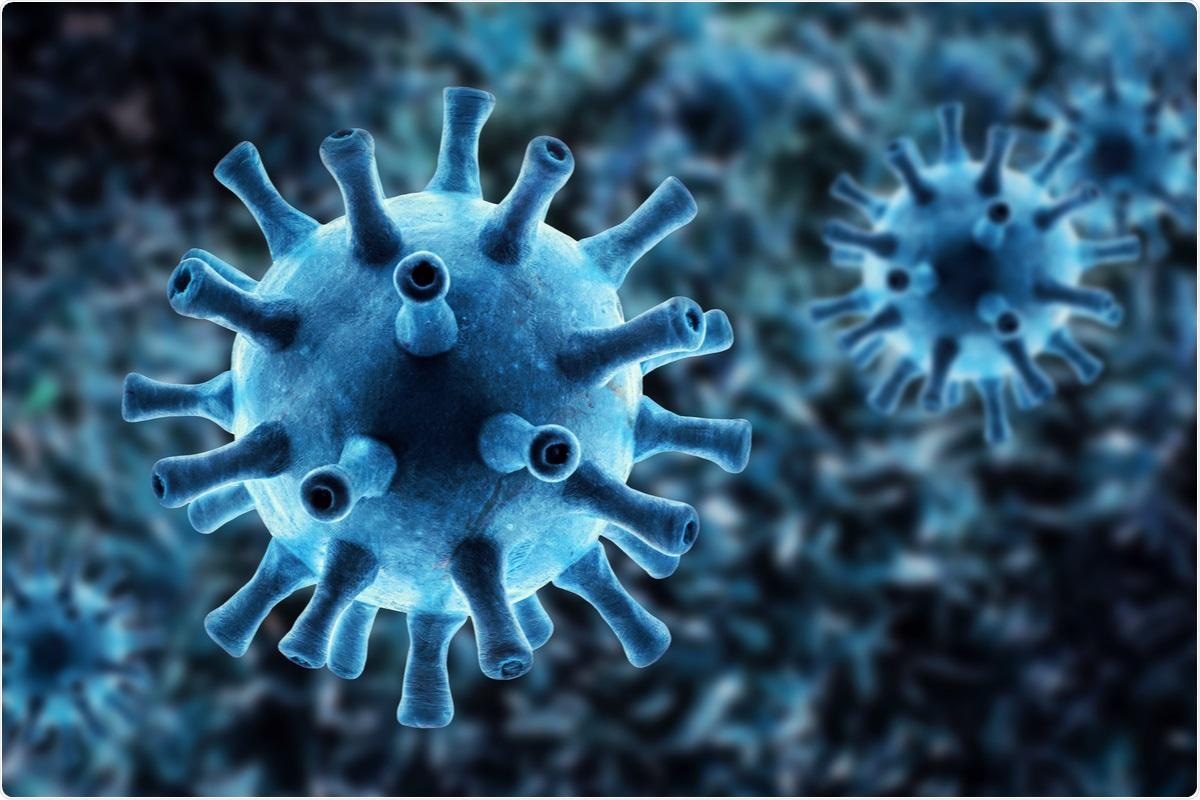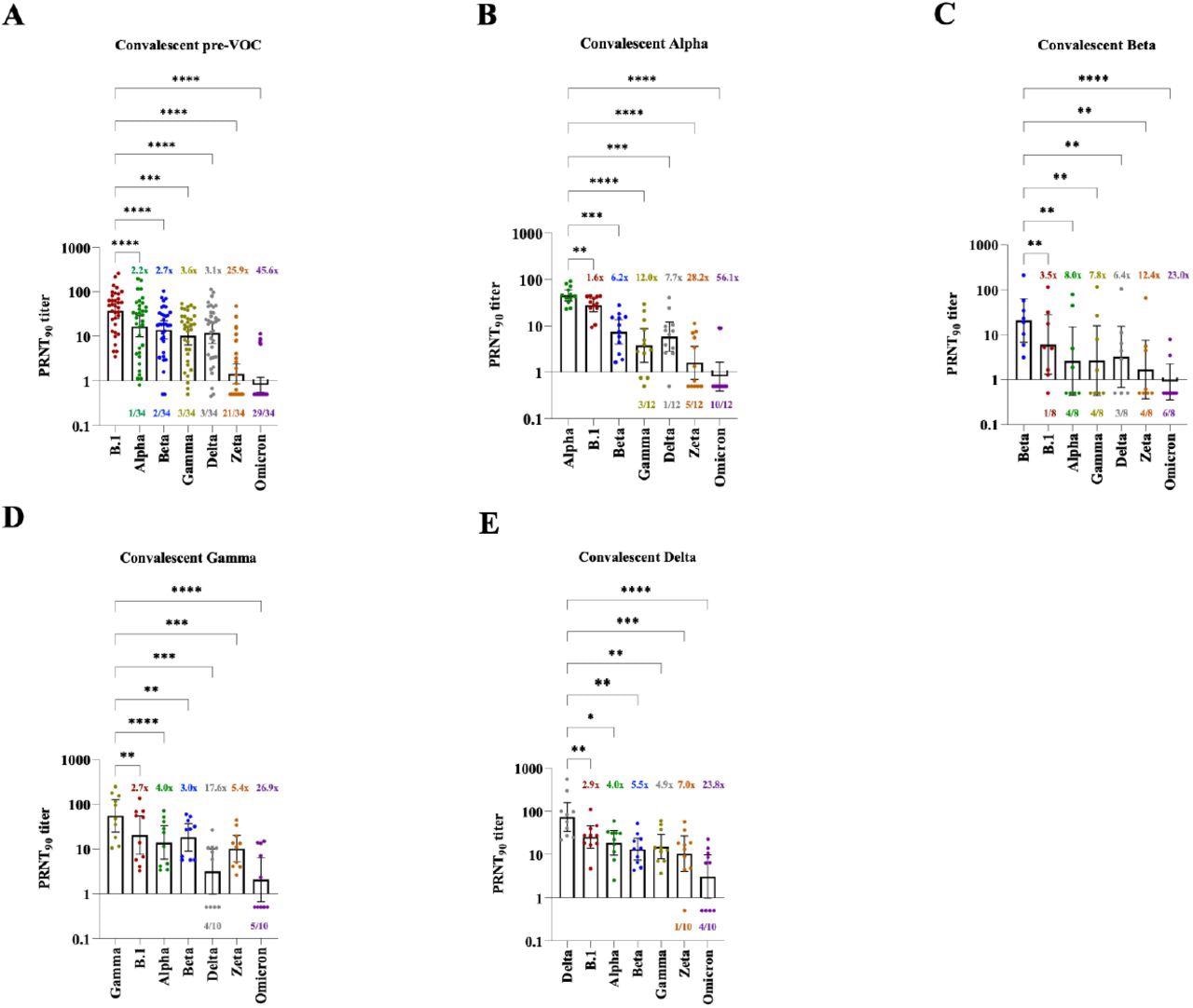Scientists assess effectiveness of neutralizing antibodies against seven SARS-CoV-2 variants, including Omicron

In a recent study published on the medRxiv* preprint server, researchers determined the neutralization potency of serum from coronavirus disease 2019 (COVID-19)-recovered patients and double-vaccinated individuals against seven variants of the severe acute respiratory syndrome coronavirus-2 (SARS-CoV-2).
Study: Neutralization of Ancestral SARS-CoV-2 and Variants Alpha, Beta, Gamma, Delta, Zeta, and Omicron by mRNA Vaccination and Infection-Derived Immunity through Homologous and Heterologous Variants. Image Credit: Viacheslav Lopatin / Shutterstock.com
Background
The COVID-19 pandemic has caused an unprecedented global health crisis since SARS-CoV-2 was first detected in December 2019. Soon after its emergence, SARS-CoV-2 acquired a characteristic mutation, the D614G substitution, which replaced all existing variants and remained dominant worldwide.
Later in 2020, several SARS-CoV-2 variants of concern (VOCs) emerged, the first of which was the Alpha variant detected in the United Kingdom (UK). About five VOCs have been seen to date, the most recent of which is the Omicron (B.1.1.529) variant detected in South Africa in November 2021. Besides VOCs, other variants of less concern have been detected and classified as variants of interests (VOIs).
Shortly after its emergence, the SARS-CoV-2 Omicron variant spread to many countries across the world and is quickly replacing other circulating VOCs. This increased transmissibility is due to a large number of mutations in its spike (S) protein, including over 30 substitutions.
About the study
In the present study, a team of researchers examined the neutralization potential of sera/plasma of vaccinated individuals who received two doses of either the BNT162b2 or mRNA-1273 vaccines, as well as convalescent patients who recovered from mild COVID-19. About 104 blood samples containing specimens from different time points were used in the current study.
These samples were infected with the wild-type SARS-CoV-2 strain, as well as the Alpha, Beta, Gamma, Delta, or Omicron variants. Vaccine-breakthrough samples infected with either the Delta or Omicron variant were investigated.
The authors assessed the neutralizing potency by performing a live virus plaque reduction neutralization test (PRNT) against homologous and heterologous variants. PRNT is used to detect SARS-CoV-2-specific neutralizing antibodies and is widely considered the gold standard. This assay was performed against seven authentic SARS-CoV-2 isolates, including the B.1, Alpha, Beta, Gamma, Delta, Zeta, and Omicron strains.
Study findings
The researchers observed the highest neutralization titers against the previously infecting (homologous) variant. All samples were found to neutralize the homologous virus variant.
Neutralization in infection-derived blood specimens against seven authentic isolates of SARS-CoV-2 variants (B.1, Alpha, Beta Gamma, Delta, Zeta, Omicron). Bars represent geometric mean titers (GMT) of 90% reduction endpoint titers (PRNT90) with a 95% confidence interval. Convalescent specimens are derived from individuals infected with (A) early-pandemic SARS-CoV-2 (pre-VOC), (B) Alpha (C) Beta (D) Gamma (E) Delta. Colored numbers above bars refer to fold change reduction of GMT versus the homologous (infecting) variant, shown as the first bar of each figure. Colored numbers below each bar represent the number of specimens with complete loss of neutralization (PRNT90 titer < 1).
Further, neutralizing titers of specimens from double-vaccinated individuals were higher when compared to convalescent samples. High neutralization titers were observed in all samples for all variants tested. Complete loss of neutralization was observed only for five (31%) Omicron samples.
All samples with prior SARS-CoV-2 infection and double vaccination reported neutralization potency against all assessed variants. However, the mean geometric PRNT90 titers against the Omicron variant were lower (65.2), with an 18.2-fold reduction compared to the B.1 variant.
Eight samples of double-vaccinated individuals following a breakthrough infection with either the Delta or Omicron variant were analyzed against both variants. Individuals with Delta breakthrough infection reported high neutralization against homologous (Delta) virus, while a 12.5-fold reduction was observed against the heterologous (Omicron) variant. Similarly, a 1.5-fold loss in neutralization potency was observed against the Delta variant in Omicron variant breakthrough samples.
Conclusions
The observations of this study suggest that the highest neutralization titers across all assays were always seen against the homologous virus (infecting strain or vaccine strain). Conversely, the neutralization potency was relatively low for heterologous strains.
The investigation revealed that infection-derived immunity is poor against the SARS-CoV-2 Omicron variant independent of infecting strain. As with samples of vaccine-induced immunity, neutralization titers were relatively higher than that of convalescent samples; however, decreased potential was noted when tested against the B.1.1.529 variant.
The Zeta variant reported marked escape from neutralization in convalescent samples and, despite showing escape potential, did not cause a massive surge in infections when compared to other SARS-CoV-2 variants. However, the study also noted that double-vaccination restored immunity against the Zeta variant.
Strong neutralization potential was observed in vaccine breakthrough infections against both the Delta and Omicron variants. However, in Delta breakthrough infection samples, a 12.5-fold loss in neutralization potency was noted against the Omicron variant, while in Omicron breakthrough specimens, only a small 1.5-fold reduction in neutralization potency was observed. This suggests that immunity could be boosted against variants similar to the vaccine strain when antigenically different variants cause COVID-19.
In conclusion, the findings of this study indicate that combined immunity derived through infection-vaccination after breakthrough could boost immune responses and provide broad immunity against different SARS-CoV-2 variants. The findings proposed that existing vaccines might not be sufficient in the future to end the pandemic completely.
*Important notice
medRxiv publishes preliminary scientific reports that are not peer-reviewed and, therefore, should not be regarded as conclusive, guide clinical practice/health-related behavior, or treated as established information
- Bekliz, M., Adea, K., Vetter, P., et al. (2021). Neutralization of Ancestral SARS-CoV-2 and Variants Alpha, Beta, Gamma, Delta, Zeta, and Omicron by mRNA Vaccination and Infection-Derived Immunity through Homologous and Heterologous Variants. medRxiv. doi:10.1101/2021.12.28.21268491. https://www.medrxiv.org/content/10.1101/2021.12.28.21268491v1
Posted in: Medical Science News | Medical Research News | Disease/Infection News
Tags: Antibodies, Assay, Blood, Coronavirus, Coronavirus Disease COVID-19, covid-19, Global Health, Homologous, immunity, Mutation, Omicron, Pandemic, Protein, Respiratory, SARS, SARS-CoV-2, Severe Acute Respiratory, Severe Acute Respiratory Syndrome, Syndrome, Vaccine, Virus

Written by
Susha Cheriyedath
Susha has a Bachelor of Science (B.Sc.) degree in Chemistry and Master of Science (M.Sc) degree in Biochemistry from the University of Calicut, India. She always had a keen interest in medical and health science. As part of her masters degree, she specialized in Biochemistry, with an emphasis on Microbiology, Physiology, Biotechnology, and Nutrition. In her spare time, she loves to cook up a storm in the kitchen with her super-messy baking experiments.
Source: Read Full Article

